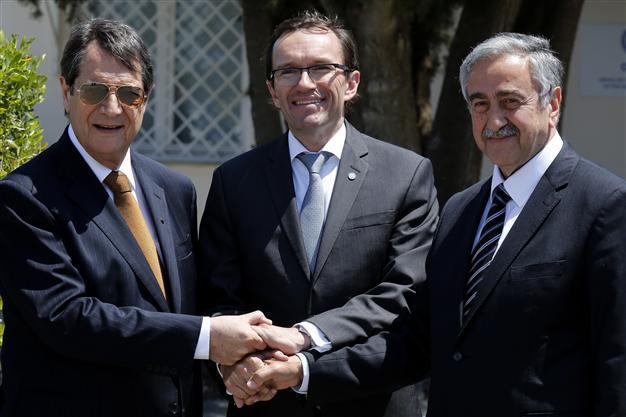Anastasiades: New Ankara gov’t may affect Cyprus talks
Güven Özalp - BRUSSELS

Cyprus President Nicos Anastasiades, left, Turkish Cypriot leader Mustafa Akinci, right, and United Nations envoy Espen Barth Eide shake hands after their talks at a UN compound inside the the U.N buffer zone at the abandoned Nicosia airport in the Cypriot divided capital Nicosia, Friday, May 15, 2015. AP Photo
Both sides in Cyprus must work to find a solution that does not create winners or losers on the divided island, Greek Cypriot leader Nicos Anastasiades told Hürriyet in a recent interview, adding that a new government in Turkey may have a “direct effect” on the talks that recent got back on track.“Depending on who is going to form the coalition government in Turkey, or whether there is going to be a new election, I think the situation will affect Cyprus,” Anastasiades said.
“I do not want to make any comments on the internal situation in Turkey. All I can say is that, as Cypriots, knowing that a key element of the decision-making is in Ankara, the situation is definitely dependent on the government that is in power and how helpful it might be,” he added.
Referring to the recently reinvigorated talks, Anastasiades said he and Turkish Cypriot leader Mustafa Akıncı, who was elected in April, shared the same vision. “It is indeed a crucial moment for Cyprus. Full of hope … [We share] a vision to work tirelessly in order to find a solution on the agreed basis of a bi-zonal, bi-communal federation with political equality in a single sovereignty, single-citizenship and single-international legal personality.”
“The climate is quite positive due to the political history of Mr. Akıncı. Of course, my own commitment is well-known. This is the moment that we have to work for in order to find, as soon as possible, a solution that will not create losers or winners,” he said.
“After 41 years, and with the presence of two leaders who are committed to the reunification of the island, I think we have a great chance. It is one of the best chances we have had ever since the problem was created,” Anastasiades added.
The Greek Cypriot president declined to give an exact timeframe for the talks, preferring instead to say “the soonest possible.”
“There are no timeframes, because if you set timetables it means you are under pressure. This has been demonstrated in the past … It proved counterproductive and ineffective, with the most apt example being the process that led to the Annan plan,” he said, referring to the plan named after the former United Nations Secretary General Kofi Annan that was rejected by Greek Cypriots in a 2004 referendum.
Anastasiades said Turkey’s contribution to talks is vital, as a number of core issues are directly dependent on Turkey.
“I will give you an example with regard to Confident Building Measures [CBMs]. We are talking about the opening of many more crossing points [between northern and southern Cyprus]. But the most important crossing points, which will benefit both communities, are being characterized by the other side as military zones. In this respect, the demilitarization of certain areas, or as many areas as possible, is going to be one of the most important CBMs. But we need the support of Turkey to do this. We also definitely need the contribution of Turkey regarding core issues such as the withdrawal of troops, territorial adjustments, settlers and so on,” he said.
Asked about the Turkish military presence on the island, Anastasiades said a solution would make them “anachronistic.”
“It goes without saying that if we find a solution, we consider the presence of foreign troops to be an anachronistic concept for a modern European state. We will discuss all the core issues in due course and I expect that we will be in a position to find a solution,” he said.
“We are a member of the European Union. There might be a need for a small military force to contribute towards certain obligations we have for CSDP [Common Security and Defense Policy] missions and Search and Rescue activities, as well as the fight against asymmetrical threats such as terrorism. Otherwise, we support demilitarization,” he added.
“Of course, we have to take into consideration the mistrust of Greek Cypriots toward Turkey, while at the same time we have to take into consideration the mistrust of our Turkish Cypriot compatriots toward the Greek Cypriots. We will find a way. We are a European country. Europe is one of the best solutions to give maximum protection to both Greek Cypriots and Turkish Cypriots. It may be that, for a transitional period, United Nations forces will have to look after the implementation of the solution,” Anastasiades added.
“The most important thing is for the solution to be a win-win situation and for the people to accept it. This is quite important. Nobody can ignore the concerns of the Greek Cypriots or the concerns of the Turkish Cypriots. It should be a balanced compromise and it should not ignore the protection of human rights and the Acquis,” he said.
Natural gas exploration rights around the island remain a core issue in the negotiations. Italian oil and gas firm ENI was recently licensed by the Greek authorities for search activities in the Mediterranean, Anastasiades recalled.
“They have carried out two exploratory drillings but due to technical reasons, they have currently suspended their drilling. For the time being, apart from the management of the already discovered natural gas in the Aphrodite field, there are no plans for further drillings. Of course, the obligations of ENI are there. We are negotiating to give them the time they need in order to overcome these technical issues,” he said.
















